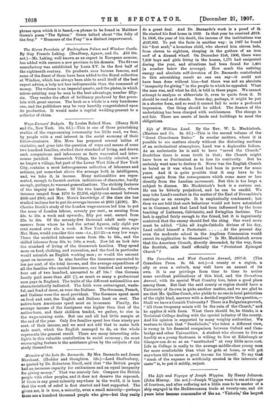Memoirs of the Late Dr. Barnard°. By Mrs. Bernardo and
James Merchant. (Hodder and Stoughton. 12s.)—Lord Shaftesbury, as quoted by Dr. Robertson Nicoll, said that "the British people had an immense capacity for enthusiasm and an equal incapacity for giving money." That was scarcely fair. Compare the British people with other peoples, and it does not deserve the reproach. If there is any great calamity anywhere in the world, it is here that the work of relief is first started and best supported. The givers are, it is true, a minority, even a small minority—perhaps there are a hundred thousand people who give—but they really do a great deal. And Dr. Barnardo's work is a proof of it. He started his first home in 1869. In that year he received 4818. In 1906, the year of hie death, the income of the institutions was 4197,892. To put the facts in another way: in 1867 he found his "first arab," a homeless child, who showed him eleven lads, from eleven to eighteen, sleeping in the gutters of an iron roof of a disused wharf. On December 31st, 1906, there were 7,809 boys and girls living in the homes, 1,171 had emigrated during the year, and situations had been found for 1,401 (a number below the average). How much the untiring energy and absolute self-devotion of Dr. Barnardo contributed to this astonishing result no one can say—it could not have been done without him—but there was not an absolute " incapacity for giving " in the people to which he appealed. What the man was, and what he did, is told in these pages. We cannot attempt to analyse or abbreviate it, even to quote from it. It should be read as it stands. Some day, perhaps, it might be put in a shorter form, and so read it cannot fail to make a profound impression. One thing should be added. The finance of the undertaking has been charged with recklessness. The charge is not fair. There are assets of lands and buildings to meet the obligations.














































 Previous page
Previous page